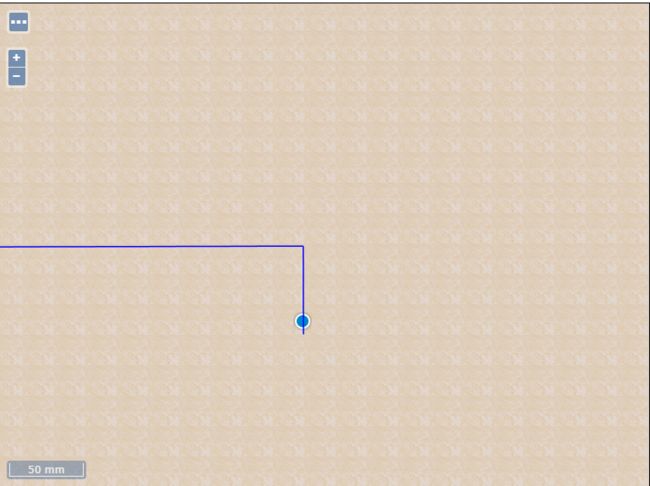基于postGIS的室内地图最短路径算法三
在上一篇基于postGIS的室内地图最短路径算法二中,在路径搜索中加入了楼层分析的概念。在使用过程中会产生一个问题就是,只给出了路网上的线,没有给出起点、终点到路网的连线,用户体验很差。
在这里加入了起点终点到路网分析结果的连线,最后返回,geoserver和leaflet部分代码同前两篇路径分析代码一致,这里就只给出数据库代码:
DROP FUNCTION pgr_floor_test(character varying, double precision, double precision, double precision, double precision, integer);
--tbl路网表名
--startx起点经度
--starty起点纬度
--endx终点经度
--endy终点纬度
--fnumber楼层
CREATE OR REPLACE function pgr_floor_test(tbl varchar,startx float, starty float,endx float,endy float,fnumber integer)
--限制返回类型
returns geometry as
$body$
declare
fmin integer;
fmax integer;
v_startLine geometry;--离起点最近的线
v_endLine geometry;--离终点最近的线
v_startTarget integer;--距离起点最近线的终点
v_startSource integer;
v_endSource integer;--距离终点最近线的起点
v_endTarget integer;
v_statpoint geometry;--在v_startLine上距离起点最近的点
v_endpoint geometry;--在v_endLine上距离终点最近的点
v_res geometry;--最短路径分析结果
v_res_a geometry;
v_res_b geometry;
v_res_c geometry;
v_res_d geometry;
v_perStart float;--v_statpoint在v_res上的百分比
v_perEnd float;--v_endpoint在v_res上的百分比
v_shPath_se geometry;--开始到结束
v_shPath_es geometry;--结束到开始
v_shPath geometry;--最终结果
tempnode float;
startpoint geometry;
endpoint geometry;
v_shPath1 geometry;--一次结果
v_shPath2 geometry;--二次结果
star_line geometry; --起点到最近点的线
end_line geometry; --终点到最近点的线
geoARR geometry[];
lines myline[];--返回线集
line1 myline;
line2 myline;
line3 myline;
begin
fmin=fnumber*1000;
fmax=fmin+1000;
raise notice '%', fmin;
raise notice '%', fmax;
--查询离起点最近的线
--4326坐标系
--找起点15米范围内的最近线
execute 'select geom, source, target from ' ||tbl||
' where ST_DWithin(geom,ST_Geometryfromtext(''point('|| startx ||' ' || starty||')'',4326),15)
and source between '||fmin||' and '||fmax||' order by ST_Distance(geom,ST_GeometryFromText(''point('|| startx ||' '|| starty ||')'',4326)) limit 1'
into v_startLine, v_startSource ,v_startTarget;
raise notice '%', v_startSource;
raise notice '%', v_startTarget;
--查询离终点最近的线
--找终点15米范围内的最近线
execute 'select geom, source, target from ' ||tbl||
' where ST_DWithin(geom,ST_Geometryfromtext(''point('|| endx || ' ' || endy ||')'',4326),15)
and source between '||fmin||' and '||fmax||'
order by ST_Distance(geom,ST_GeometryFromText(''point('|| endx ||' ' || endy ||')'',4326)) limit 1'
into v_endLine, v_endSource,v_endTarget;
raise notice '%', v_endSource;
raise notice '%', v_endTarget;
--如果没找到最近的线,就返回null
if (v_startLine is null) or (v_endLine is null) then
return null;
end if ;
select ST_ClosestPoint(v_startLine, ST_Geometryfromtext('point('|| startx ||' ' || starty ||')',4326)) into v_statpoint;
select ST_ClosestPoint(v_endLine, ST_GeometryFromText('point('|| endx ||' ' || endy ||')',4326)) into v_endpoint;
-- ST_Distance
--从开始的起点到结束的起点最短路径
execute 'SELECT st_linemerge(st_union(b.geom)) ' ||
'FROM pgr_kdijkstraPath(
''SELECT gid as id, source, target, length as cost FROM ' || tbl ||''','
||v_startSource || ', ' ||'array['||v_endSource||'] , false, false
) a, '
|| tbl || ' b
WHERE a.id3=b.gid
GROUP by id1
ORDER by id1' into v_res ;
--从开始的终点到结束的起点最短路径
execute 'SELECT st_linemerge(st_union(b.geom)) ' ||
'FROM pgr_kdijkstraPath(
''SELECT gid as id, source, target, length as cost FROM ' || tbl ||''','
||v_startTarget || ', ' ||'array['||v_endSource||'] , false, false
) a, '
|| tbl || ' b
WHERE a.id3=b.gid
GROUP by id1
ORDER by id1' into v_res_b ;
--从开始的起点到结束的终点最短路径
execute 'SELECT st_linemerge(st_union(b.geom)) ' ||
'FROM pgr_kdijkstraPath(
''SELECT gid as id, source, target, length as cost FROM ' || tbl ||''','
||v_startSource || ', ' ||'array['||v_endTarget||'] , false, false
) a, '
|| tbl || ' b
WHERE a.id3=b.gid
GROUP by id1
ORDER by id1' into v_res_c ;
--从开始的终点到结束的终点最短路径
execute 'SELECT st_linemerge(st_union(b.geom)) ' ||
'FROM pgr_kdijkstraPath(
''SELECT gid as id, source, target, length as cost FROM ' || tbl ||''','
||v_startTarget || ', ' ||'array['||v_endTarget||'] , false, false
) a, '
|| tbl || ' b
WHERE a.id3=b.gid
GROUP by id1
ORDER by id1' into v_res_d ;
if(ST_Length(v_res) > ST_Length(v_res_b)) then
v_res = v_res_b;
end if;
if(ST_Length(v_res) > ST_Length(v_res_c)) then
v_res = v_res_c;
end if;
if(ST_Length(v_res) > ST_Length(v_res_d)) then
v_res = v_res_d;
end if;
--如果找不到最短路径,就返回null
if(v_res is null) then
return null;
end if;
--将v_res,v_startLine,v_endLine进行拼接
select st_linemerge(ST_Union(array[v_res,v_startLine,v_endLine])) into v_res;
--return v_res;
select ST_LineLocatePoint(v_res, v_statpoint) into v_perStart;
select ST_LineLocatePoint(v_res, v_endpoint) into v_perEnd;
if(v_perStart > v_perEnd) then
tempnode = v_perStart;
v_perStart = v_perEnd;
v_perEnd = tempnode;
end if;
--截取v_res
--拼接线
SELECT ST_Line_SubString(v_res,v_perStart, v_perEnd) into v_shPath1;
--接下来进行
--找线的端点
-- select ST_ClosestPoint(v_endLine, ST_GeometryFromText('point('|| endx ||' ' || endy ||')',4326)) into v_endpoint;
-- select ST_MakePoint(endx , endy) into startpoint;
select ST_SetSRID( ST_MakePoint(startx , starty),4326 )into startpoint;
select ST_SetSRID( ST_MakePoint(endx , endy),4326 )into endpoint;
select ST_MakeLine( v_statpoint,startpoint) into star_line;
select ST_MakeLine( v_endpoint,endpoint) into end_line;
-- select st_union(end_line,v_shPath1) into v_shPath2;
--select st_union(star_line,v_shPath2) into v_shPath;
--line1.id=1;
--line1.geom=star_line;
--line2.id=2;
--line2.geom=v_shPath1;
--line3.id=3;
--line3.geom=end_line;
--lines[0]=line1;
--lines[1]=line2;
--lines[2]=line3;
geoARR :=array[end_line,v_shPath1,star_line];
select st_union(geoARR) into v_shPath;
raise notice '%', '返回数据';
--return geoARR;
--return lines;
return v_shPath;
end;
$body$
LANGUAGE plpgsql VOLATILE STRICT;运行效果如下图所示,结果有1厘米的误差
